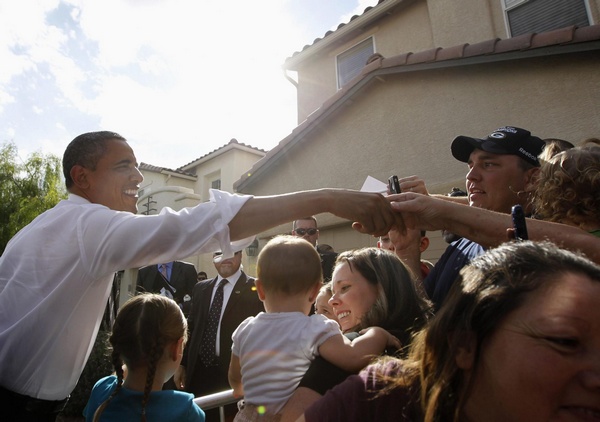Obama tests go-it-alone steps for US economy
Updated: 2011-10-25 11:02
(Agencies)
|
|||||||||
LAS VEGAS - US President Barack Obama launched the first in a series of executive actions on Monday aimed at bypassing Republicans in Congress to show American voters he is serious about tackling a jobs and housing crisis that endangers his re-election.
 |
|
US President Barack Obama greets residents of a Las Vegas suburb, October 24, 2011. [Photo/Agencies] |
Trying to seize the initiative and demonstrate he will take steps on his own if lawmakers do not act, Obama began a campaign-style swing through Western states seen as crucial to his chances of winning a second term in the November 2012 election.
Armed with the new slogan "We can't wait," the president started the three-day trip in economically hard-hit Nevada, a key political battleground and the state with the highest home foreclosure rate. He then goes to California and Colorado.
Obama's strategy is aimed at further painting Republicans as obstructing economic recovery, most recently by impeding his $447 billion jobs package in Congress, and making clear he is not powerless to act.
Questions remain about whether go-it-alone remedies - the first of which was Monday's announcement of a expanded mortgage refinancing program to help struggling homeowners keep their homes - can do much to revive the anemic economy and reduce stubbornly high unemployment.
"I'm here to say to the people of Nevada, the people of Las Vegas: we can't wait for an increasingly dysfunctional Congress to do its job. Where they won't act, I will," Obama told a small crowd of homeowners in front of the home of a family that he had visited to chat about aid for the housing market.
US homeowners who owe more than their properties are worth got new help with word that a federal housing regulator is easing the terms of a program that helps so-called "underwater" borrowers who have been on time with payments but are unable to refinance.
The plan, which does not require congressional approval, is the latest effort to shore up the weak US housing market. The lingering problem is crucial to the economic recovery and remains a political liability for Obama.
It was unclear whether Obama's approach, which falls short of an overarching plan some experts have called for, will give enough of a boost to the battered market to spur growth.
A lawmaker earlier this month estimated an expanded program could help as many as 600,000 to 1 million additional borrowers. But that is only a fraction of the estimated 11 million homeowners who are classified as underwater.
Student loan program
Obama will lay out a new student loan initiative in another swing state, Colorado, on Wednesday and keep rolling out at least one new initiative each week, said White House communications director Dan Pfeiffer.
Other executive steps are likely to include help for small businesses, and the White House said that on Tuesday it will unveil action to help boost jobs for military veterans. It did not say how many jobs it expected this step to create.
But aides to the president, who has operated by executive order before, appeared to concede his options for acting on his own authority can have only a modest impact compared with his broader stimulus program now stalled in Congress.
"They are not a substitute for congressional action, which is why he continues to urge Congress to wake up," White House spokesman Jay Carney told reporters aboard Air Force One.
Obama, who shed his jacket in the warm Nevada afternoon and spoke without the help of a teleprompter, insisted the unilateral measures would "make a difference" but acknowledged it would take time for the housing market to heal fully.
The president's latest moves come after Republicans defeated his full jobs plan in Congress and then voted down Obama's first efforts to get his proposals through piecemeal, despite polls showing strong public support for the package.
Brendan Buck, spokesman for House of Representatives Speaker John Boehner, the top Republican in Congress, accused Obama of campaigning instead of working to find common ground.
"The best way to achieve the outcome they are looking for would be to pick up the phone and work with Republicans instead of starting a fresh new campaign," Buck said.
Obama is seeking to capitalize on public displeasure with Congress after a summer of legislative gridlock.
Obama's public approval ratings have fallen to close to 40 percent, the low of his presidency, because of discontent with his economic stewardship.
Congress, where Republicans control the House and Obama's Democrats control the Senate, is even more unpopular. Its approval rating fell to about 12 percent after budget battles pushed the government to the brink of a shutdown and an unprecedented default on the national debt.
The states on Obama's tour were chosen deliberately.
Each has large populations of Hispanics, a voting bloc Obama's campaign is eager to win over. Nevada and Colorado are "swing states" which alternate allegiance between Republicans and Democrats, making them valuable election prizes.











